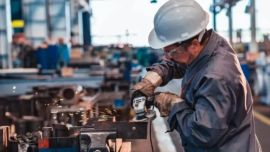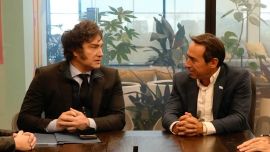If Heisenberg’s uncertainty principle was originally applied to particles almost a century ago, the tiny coronavirus particle today has multiplied uncertainty way beyond the field of quantum mechanics. Absolutely no country in the world can envisage the post-pandemic world with any clarity but, at the risk of going down the long-trodden road of Argentine exceptionalism, perhaps no nation carries uncertainty to the same extremes as here – and not just because we could be ending this winter with the world’s longest quarantine, overtaking the Covid-19 birthplace of Wuhan before next weekend and even New York City, if the increasingly frequent talk of lockdown deep into August (at least in this metropolitan area) is confirmed.
Argentina does not differ unduly from the rest of the planet in terms of the problems posed by the pandemic – neither the public health challenges nor the induced coma of economic activity while even the debt issue is overrated – but where it parts company is in the solution which overlaps with the underlying pre-coronavirus problem.
Elsewhere the world is waking up to the fact that the strategies halting the last global crisis, the 2008-2009 financial meltdown, only ended up compounding its causes. The massive liquidity needed to relaunch markets drained by the collapse of subprimes and derivatives found its way into too few pockets, creating an inequality which undermined the impressive globalisation of the last decade – in particular the middle classes (although perhaps not worse-off with all the benefits of technological advance) suffered a loss of status and social mobility leading to an anti-elite backlash featuring a surge of populism and protectionism. While the multi-billion and even multi-trillion packages needed to keep lockdown economies running create an obvious danger of new excesses of liquidity, the vacuum making the state the only real refuge worldwide dovetails with a chance to correct this inequality. If the solution to the last crisis concentrated wealth into too few hands, the inevitable advance of the state courtesy of Covid-19 offers an opportunity to improve the distribution of income.
That opportunity also exists for Argentina, as President Alberto Fernández never tires of saying, but the problem is that solution lying in a state is too often confused with government (as illustrated by the week’s Freudian slip attributing the payment of half of the wages in distressed companies to the national government, not the state, later corrected). That government in turn is currently a coalition headed by a president and a vice-president representing very different mind-sets and wings, with the former a master of ambiguity.
That ambiguity was on display in Formosa on Thursday. On the one hand, the president rubbished the idea of requiring companies to hand over shares in return for the aforementioned state wage assistance and on the other hand, he praised Formosa (a backwater ruled by the same governor for the last quarter-century, with an almost non-existent private sector) as a “model” for Argentina’s revival. Two contradictory statements without even the chance of using the “read my lips” phrase immortalised by the elder George Bush, since he was wearing a face-mask.
The question then arises whether he means either, both or neither of these contradictory propositions and whether it matters if he does. Opposition analysts made a meal out of his praise for Formosa but presumably he was only saying it because he was there. And yet, if the worst-case scenarios of lockdown materialise, the statement could prove prophetic – Formosa (95 percent dependent on central government funding via federal revenue-sharing, less than 30,000 employees in the private sector and a mere US$20 million in exports) could indeed be the “model.” Again Fernández (whose political career began under the neo-conservative economy minister Domingo Cavallo) might well be sincere in defending the huge universe of companies now requiring assistance from nationalisation but the scale of the crisis and the strength of the wing responding to his vice-president, Cristina Fernández de Kirchner, might leave him no choice.
The way ahead for the world might well be more state to correct previous imbalances but for Argentina to share in that solution it will need a state (complete with a professional civil service and reformed at national, provincial and municipal levels) in the first place with a life beyond governments.






















Comments